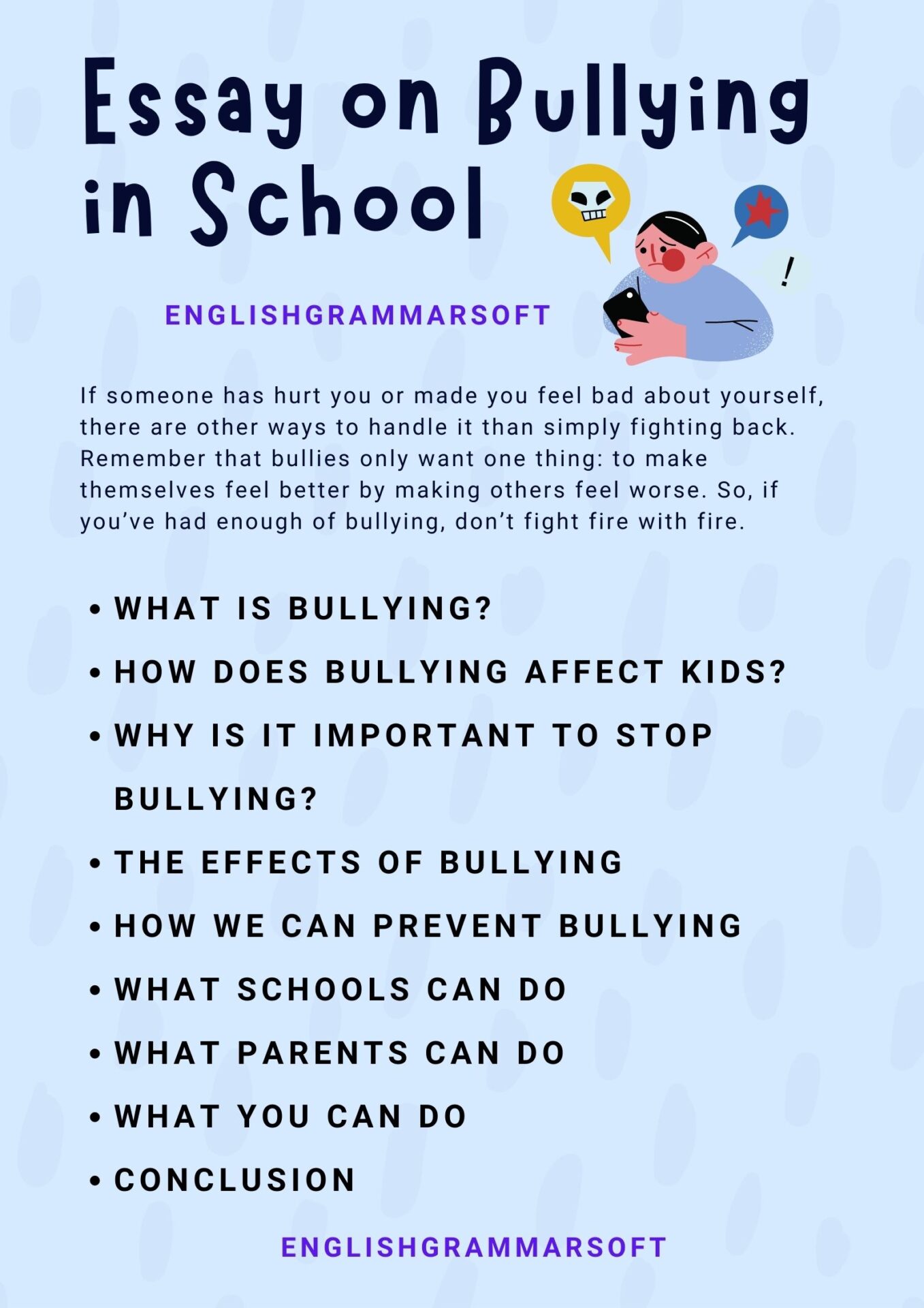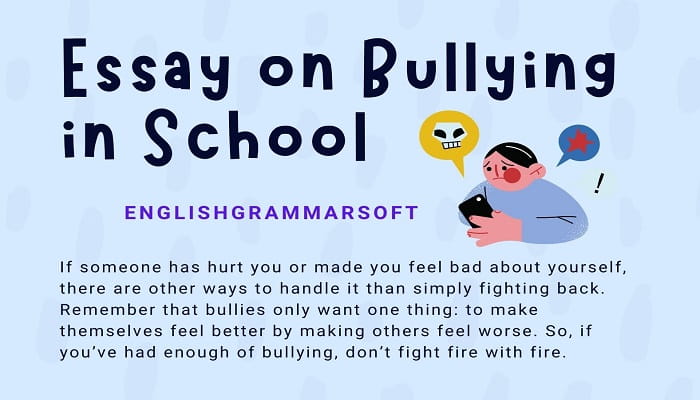Free Essay on Bullying in Schools
If someone has hurt you or made you feel bad about yourself, there are other ways to handle it than simply fighting back. Remember that bullies only want one thing: to make themselves feel better by making others feel worse. So, if you’ve had enough of bullying, don’t fight fire with fire.
Instead, change your perspective by standing up for yourself in more positive ways. This essay has some tips on how to do just that.
Essay on Bullying in Schools
Kids who are bullied often feel frustrated, victimized, and unsafe in their school environment. This can make it hard for them to concentrate on schoolwork.
Bullying has serious impacts on kids’ mental health and could lead to long-term problems like depression and anxiety.
It is a problem that has affected many children and adults – both in school and out of school. It can be physical, verbal, or emotional, and it can happen over the phone, text messaging, or the internet.
It’s not just one thing that makes someone bully someone else – it can be anything from jealousy to loneliness to anger.
Bullying is not something that should be tolerated because it really affects people’s lives. It also hurts the bullies themselves, as they may develop a sense of self-hatred or a lack of empathy. Here are some ways that you can help to end bullying in your own community.
What Is Bullying?
Bullying can have many different forms, including name-calling and mean nicknames. When I was a kid, kids would shout my name and call me a fatso. They would say mean things like “Hey fatty, you think you’re so smart,” “Fatty, do you really want to know?” or “Fatty, you’re fat.” This was followed by the slapping sound of my friends’ palms across my cheeks.
Bullying has been an issue in schools for decades. It is a major problem that plagues many schools, and yet it is still not taken seriously by some teachers and school administrators.
The consequences of bullying can last long after the bullying has ended, with victims often suffering from depression or anxiety. Victims are also more likely to engage in self-harm or suicidal behavior.
How Does Bullying Affect Kids?
Whether you’re the one being bullied or someone who witnesses bullying, it can feel incredibly uncomfortable and scary.
Kids may lose sleep or eat more, feel trapped or ashamed of themselves, worry about what others think of them. When they’re bullied, kids may cry or become very angry.
They may also stop participating in social activities, lie about doing well in class, or even change their appearance to avoid bullying.
This kind of bullying can really impact their mental health and lead to long-term problems like depression, anxiety, and even post-traumatic stress disorder.
Bullying can affect kids’ self-esteem, meaning that they may stop caring about their looks or self-worth.
Why Is It Important To Stop Bullying?
It is necessary to stop bullying because children who are bullied can experience a range of mental health problems. Some children may withdraw and sleep much more than usual.
Others might become anxious, fearful, or depressed. In extreme cases, some may become suicidal. Even short-term bullying can have long-term mental health implications.
In addition, children who are bullied in school are at increased risk for depression and suicidal thoughts.
The Effects of Bullying
Bullying causes significant distress and impacts the ability to learn. Studies have shown that children who are bullied are less likely to achieve at school.
Bullying can also have negative effects on a child’s physical health. For example, children who are victims of bullying are more likely to get sick or have accidents when at school.
As a result of their symptoms, kids are less likely to feel safe in the classroom, which can negatively impact their performance.
It can lead to anxiety, depression, and even suicide. Kids who are bullied are more likely to have problems in the areas of social and emotional well-being. They may also be more likely to have suicidal thoughts and even attempt suicide.
How We Can Prevent Bullying
If you know of someone who is being bullied or witnessed someone being bullied, you can help them.
First, speak up! By doing so, you are helping to create a climate in which it is safe to talk about being bullied.
Also, you can take a stand against bullying by participating in an anti-bullying club at your school or organizing a school event against bullying.
This could include inviting local police or juvenile officers to talk about how they deal with bullying and holding a fundraiser for anti-bullying causes.
You could also invite people to share their stories of being bullied. Taking action could change the bullying culture at your school and start to prevent bullying.
What Schools Can Do
Take a proactive role in preventing bullying. Educate staff on bullying prevention and intervention techniques.
Create anti-bullying programs that are led by parents and other caregivers in your school community. Provide a safe space for kids to discuss their experiences with other kids or adults.
Maintain a positive school climate and resolve conflicts. Educate your students about how to communicate respectfully and resolve conflict peacefully.
Discipline students for bullying that causes physical or psychological harm or property damage. Contact the school resource officer, school counselors, teachers, or parents of a victim. Bullying can lead to criminal charges in the State of Illinois.
What Parents Can Do
Sign the Pledge:
If you are a parent, sign the pledge against bullying so your child will have an easy way to tell you if they’ve been bullied or witnessed bullying.
And remember that parents are the primary educators of their children, so set an example for your kids to follow.
Join a Community Group:
If you can’t find a group in your community, create one.
Help kids who are being bullied. There are some things you can do to help keep kids safe at school, but there are also things you can do at home to prevent your child from being bullied. 1) Create a strong relationship with your child where they feel comfortable talking to you about what’s going on in their lives 2) Teach your child how to recognize signs of bullying
What You Can Do
Tell your family and friends. Bullying starts with one student deciding that another student doesn’t belong in their group or school.
Once the word gets around that someone is being bullied, other students quickly follow suit. By talking about bullying with those around you, you’ll be raising awareness, developing healthy relationships, and possibly preventing harassment from happening in the first place.
Educate yourself. If you’re not sure how to speak to your child about bullying, there are several resources that can help you navigate that topic.
Talking to an adult who cares about you can be helpful. Consider talking to a teacher, a friend, or even a counselor.
Know that the bullying can have serious consequences, and talk to your child if he or she feels threatened.
Conclusion
As a nation, we should be dedicated to helping our children lead happier lives and to encourage them to engage in a safe, healthy, and joyful way of life.
But, how can we promote these positive ideals in our children if we refuse to accept and speak out against negative and harmful behavior in our communities? Through our support and compassion, we can influence positive behavior in all people.

More on essays
- How to Write an Essay | Structure of Essay (Comprehensive Guide)
- Essay on Happiness is a State of Mind
- Essay on Education
- Essay on importance of education
- An Essay on School Life
- Essay on Friendship
- Essay about Anxiety and Stress
- Essay on Time Management
- Essay on 7 Cs of Communication
- Essay on 8 Business Functions
- Essay on Social Media and Its Impact
- Essay on Personality Development
- Essay on Leadership
- Essay on Importance of water in life
- Essay on Pollution
- Essay on Environment Protection
- Essay on Corruption
- Essay on Why Trees are Important in our Life
- 500 Words Essay on Nature in English
- Essay on Global Warming Causes and Effects
- Essay on Deforestation
- Essay on Smoking is bad for health
- A Short Essay on Mothers Day
- Essay on Health is Wealth







